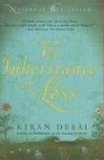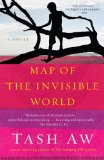Summary | Excerpt | Reading Guide | Reviews | Beyond the book | Read-Alikes | Genres & Themes | Author Bio

In a crumbling, isolated house at the foot of Mount Kanchenjunga lives an embittered old judge who wants to retire in peace, then his orphaned granddaughter, Sai, arrives on his doorstep. When a Nepalese insurgency in the mountains causes their lives to descend into chaos, they too are forced to confront their colliding interests. Winner of the 2006 Booker Prize.
Published to extraordinary acclaim, The Inheritance of Loss heralds
Kiran Desai as one of our most insightful novelists. She illuminates
the pain of exile and the ambiguities of postcolonialism with a
tapestry of colorful characters: an embittered old judge; Sai, his
sixteen-year-old orphaned granddaughter; a chatty cook; and the cook’s
son, Biju, who is hopscotching from one miserable New York restaurant
to another, trying to stay a step ahead of the INS.
In a crumbling, isolated house at the foot of Mount Kanchenjunga lives an embittered old judge who wants to retire in peace, then his orphaned granddaughter, Sai, arrives on his doorstep.
When a
Nepalese insurgency in the mountains threatens Sai’s new-sprung romance
with her handsome tutor, their lives descend into chaos. The cook
witnesses India’s hierarchy being overturned and discarded. The judge
revisits his past and his role in Sai and Biju’s intertwining lives. A
story of depth and emotion, hilarity and imagination, The Inheritance of Loss tells “of love, longing, futility, and loss that is Desai’s true territory” (O: The Oprah Magazine).
Set in the mid-1980s in Kalimpong, high in the northeastern Himalayas (where Desai spent some of her childhood), The Inheritance of Loss centers on three people living together in an ancient house named Cho Oyu - an embittered old British-educated judge (in the words of the novel, one of the "ridiculous Indians .... who couldn't rid themselves of what they had broken their souls to learn"), his orphaned granddaughter, and their cook. As the story unfolds, insurgency is growing in the region as the people press their demands for an independent state (see sidebar for more on this). This growing unrest is contrasted against that of Indians settled abroad, in particular the cook's son, Biju, an illegal immigrant who stumbles from one job to another in the USA.
When talking of the characters in The Inheritance of Loss, and of her own life, Kiran Desai says, "The characters of my story are entirely fictional, but [the journeys of my grandparents] as well as my own provided insight into what it means to travel between East and West and it is this I wanted to capture. The fact that I live this particular life is no accident. It was my inheritance."
Desai describes The Inheritance of Loss as a book that "tries to capture what it means to live between East and West and what it means to be an immigrant," and goes on to say that it also explores at a deeper level, "what happens when a Western element is introduced into a country that is not of the West" - which happened during the British colonial days in India, and is happening again "with India's new relationship with the States." Her third aim was to write about "what happens when you take people from a poor country and place them in a wealthy one". "How does the imbalance between these two worlds change a person's thinking and feeling? How do these changes manifest themselves in a personal sphere, a political sphere, over time?"
In her words, "These are old themes that continue to be relevant in today's world, the past informing the present, the present revealing the past."
As one reviewer comments, "although relieved by much humor, The Inheritance of Loss may strike many readers as offering an unrelentingly bitter view. But then, this is the invisible emotional reality Desai uncovers as she describes the lives of people fated to experience modern life as a continuous affront to their notions of order, dignity and justice. We do not need to agree with this vision in order to marvel at Desai's artistic power in expressing it."
"[People in the West are] scarcely aware of the overwhelming feeling of humiliation that is experienced by most of the world's population [which] neither magical realistic novels that endow poverty and foolishness with charm, nor the exoticism of popular travel literature manages to fathom." - Nobel Prize winner Orhan Pamuk speaking after 9/11...continued
Full Review
(926 words)
This review is available to non-members for a limited time. For full access,
become a member today.
(Reviewed by BookBrowse Review Team).
The area around Darjeeling in North East India (map) is populated primarily by Gorkhas (also known as Gurkhas) whose ancestors founded the Kingdom of Nepal; they have long wanted an independent state. Massive violence broke out between 1986 and 1988 but was resolved with the establishment of the Darjeeling Gorkha Hill Council within West Bengal. Although some still push for statehood rather than autonomy, it seems there is not the political will at this time to press on. For example, there was a large rally in 2005 to revive the demand for a separate state but the issue did not more forward.
Gurkhas take their name from the Hindu warrior-saint Guru Gorakhnath. The Gurkhas are renowned for their bravery and ...
This "beyond the book" feature is available to non-members for a limited time. Join today for full access.

If you liked The Inheritance of Loss, try these:

by Fredrik Backman
Published 2015
In this bestselling and delightfully quirky debut novel from Sweden, a grumpy yet loveable man finds his solitary world turned on its head when a boisterous young family moves in next door. Winner of the 2014 BookBrowse Debut Novel Award.

by Tash Aw
Published 2010
From the author of the internationally acclaimed, award-winning The Harmony Silk Factory comes an enthralling new novel that evokes an exotic yet turbulent and often frightening time and place. Map of the Invisible World is the masterly, psychologically rich tale of three lives indelibly marked by the past—their own and Indonesia's.